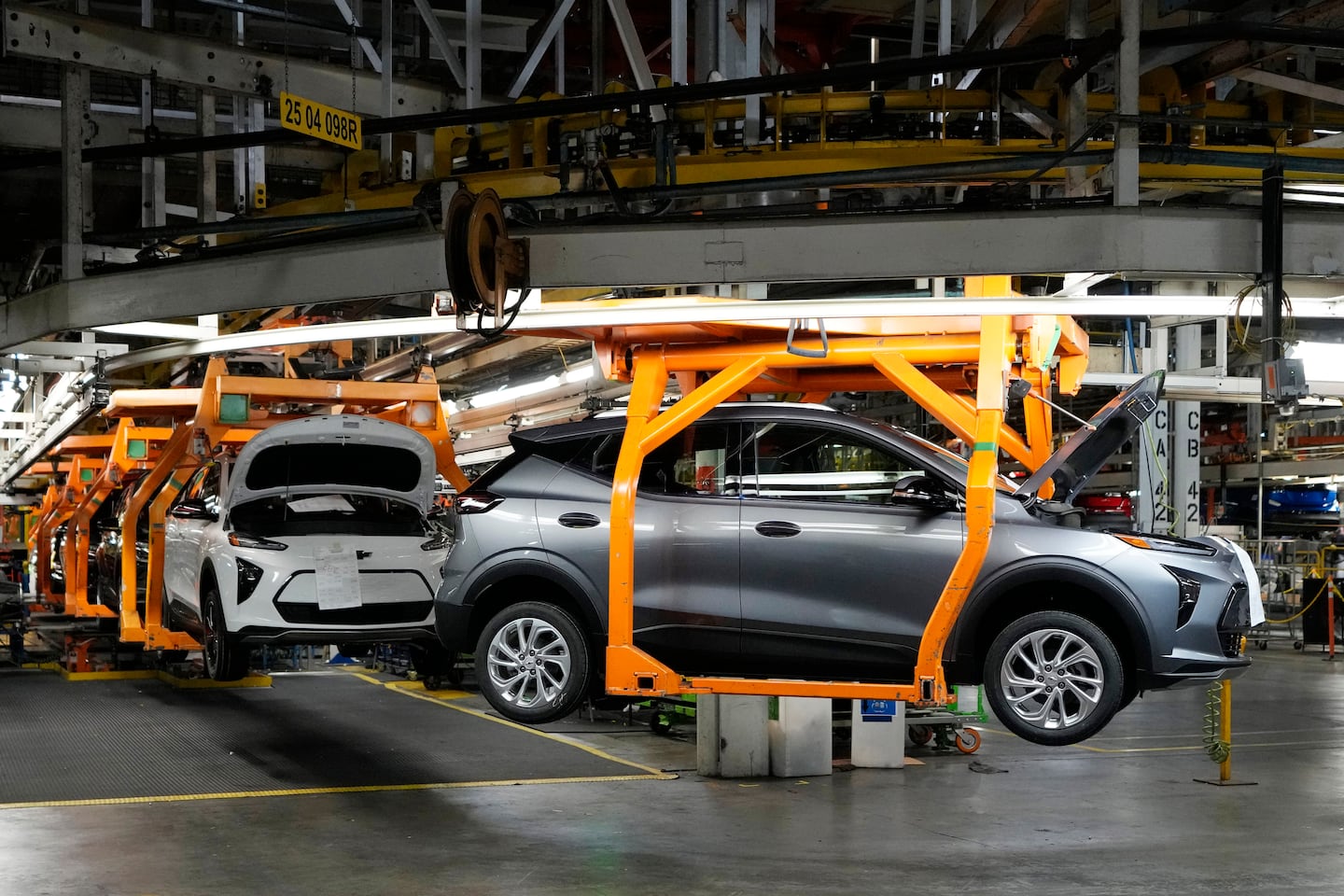Increased Resistance To EV Mandates From Car Dealerships

Table of Contents
Financial Hurdles and Investment Costs
The transition to selling and servicing electric vehicles presents substantial financial hurdles for car dealerships, particularly smaller independent businesses. The high initial investment required to adapt to the new technology is a major source of resistance to EV mandates.
High Initial Investment in Infrastructure
Dealerships need significant upfront capital to successfully integrate EVs into their operations. This includes substantial investments in several key areas:
- Costs of installing fast chargers: The installation of fast-charging stations requires specialized equipment and electrical upgrades, representing a considerable expense. The number of chargers needed will vary depending on dealership size and anticipated EV sales volume.
- Specialized EV repair equipment: Servicing EVs requires specialized tools and diagnostic equipment, which are significantly different from those used for internal combustion engine (ICE) vehicles. This necessitates a considerable investment in new tools and training for technicians.
- Employee training programs on EV technology: Technicians require comprehensive training to diagnose and repair EV components safely and efficiently. This training is costly and requires dedicated time away from regular service operations.
- Showroom renovations: Showrooms may need remodeling to effectively showcase EVs and integrate charging infrastructure. This can include dedicated EV display areas and charging points for customer demonstrations.
The financial burden of these upgrades disproportionately affects smaller dealerships, which may lack the financial resources of larger corporations to undertake such substantial investments. This disparity further fuels resistance to EV mandates, as it creates an uneven playing field within the automotive industry.
Reduced Profit Margins on EVs
Current profit margins on EVs are often lower for dealerships compared to ICE vehicles, creating another significant obstacle. Several factors contribute to this reduced profitability:
- Lower service revenue from EVs: EVs have fewer moving parts than ICE vehicles, resulting in less frequent and less complex maintenance needs. This translates to lower service revenue for dealerships.
- Increased competition in the EV market: The EV market is rapidly evolving with new entrants, increasing competition and potentially squeezing profit margins.
- Higher upfront costs for inventory: The initial investment in EV inventory can be higher due to the higher purchase price of many EV models.
This reduced profitability directly impacts dealerships' ability to invest in the necessary infrastructure to sell and service EVs effectively, further exacerbating their resistance to mandatory EV adoption.
Lack of Consumer Demand and Market Readiness
Despite growing awareness, consumer demand for electric vehicles remains somewhat limited, creating another layer of resistance to government EV mandates. This is primarily due to concerns about range anxiety and charging infrastructure.
Range Anxiety and Charging Infrastructure Concerns
Range anxiety, the fear of running out of battery charge before reaching a charging station, is a major barrier to EV adoption. This is compounded by concerns about the availability and reliability of public charging infrastructure:
- Consumer perception of long charging times: Compared to refueling an ICE vehicle, charging an EV takes significantly longer, even with fast chargers.
- Anxiety about running out of battery charge: The limited range of some EV models, particularly older models, contributes significantly to range anxiety.
- Uneven distribution of charging stations geographically: The geographical distribution of charging stations is uneven, with significant gaps in coverage in many areas, especially rural regions.
These limitations hinder consumer confidence and impact the sales of electric vehicles, indirectly affecting dealerships' willingness to fully embrace EV mandates.
Limited EV Model Choices and High Prices
Another factor limiting consumer demand is the relative lack of affordable and diverse EV models, coupled with their often high purchase prices:
- Lack of affordable EV options for different consumer segments: The market currently lacks a diverse range of affordable EVs to cater to all consumer segments, thereby limiting potential buyers.
- Price disparity compared to petrol/diesel vehicles: Many EVs are significantly more expensive than comparable petrol or diesel vehicles, making them inaccessible to many consumers.
- Limited range of EV body styles: The variety of EV body styles and configurations is still relatively limited compared to ICE vehicles, restricting consumer choice.
This limited choice and high purchase price significantly impacts consumer uptake, placing additional pressure on dealerships already grappling with the financial challenges of EV adoption.
Training and Expertise Gaps
The successful integration of EVs into dealerships also requires substantial investment in training and development, contributing to the resistance to EV mandates.
Need for Specialized EV Training for Technicians
Servicing electric vehicles requires a different skillset and specialized training compared to maintaining ICE vehicles. This poses a significant challenge for dealerships:
- Costs of specialized training programs: Training programs for EV technicians are often costly and require dedicated time commitment.
- Lack of readily available training resources: The availability of comprehensive and readily accessible EV training resources is still limited in some regions.
- Time required for retraining existing staff: Retraining existing staff takes time and reduces service department productivity during the transition.
These training challenges impact the service department's efficiency and potentially increase labor costs in the short term.
Sales Staff Knowledge and Customer Education
Sales staff also need comprehensive training to effectively educate customers about EVs and address their concerns. This involves:
- Educating staff on EV technology: Sales personnel must possess a strong understanding of EV technology, features, and charging infrastructure to address customer queries effectively.
- Addressing customer concerns and misconceptions: Sales staff play a crucial role in addressing common misconceptions and anxieties surrounding EVs.
- Highlighting the advantages of EVs: They need to effectively communicate the environmental and economic benefits of EV ownership.
Trained sales personnel are essential for boosting consumer confidence and driving EV sales; however, investing in such training represents another significant cost for dealerships.
Conclusion
The resistance to EV mandates from car dealerships stems from a complex interplay of financial challenges, market readiness issues, and the need for significant training and investment. Addressing these concerns requires a collaborative approach between policymakers, manufacturers, and dealerships to ensure a smooth transition towards sustainable transportation. This might involve government incentives, extended training programs, and targeted consumer education campaigns.
Understanding the hurdles facing car dealerships in adopting EV mandates is crucial for developing effective policies that promote electric vehicle adoption without stifling the automotive industry. Further discussions and collaboration are needed to find sustainable solutions that alleviate the concerns related to increased resistance to EV mandates. Let's work together to find solutions that support both the environment and the economic viability of our car dealerships, fostering a successful transition to a future powered by electric vehicles.

Featured Posts
-
 Ufc 315 Zahabi Contre Aldo A Montreal Attentes Et Analyse
May 12, 2025
Ufc 315 Zahabi Contre Aldo A Montreal Attentes Et Analyse
May 12, 2025 -
 65 Rokiv Printsu Endryu Ditinstvo V Korolivskiy Rodini
May 12, 2025
65 Rokiv Printsu Endryu Ditinstvo V Korolivskiy Rodini
May 12, 2025 -
 Fremont Wolf River Firefighter Receives National Honor
May 12, 2025
Fremont Wolf River Firefighter Receives National Honor
May 12, 2025 -
 Yankees Diamondbacks Injured Players For April 1 3 Series
May 12, 2025
Yankees Diamondbacks Injured Players For April 1 3 Series
May 12, 2025 -
 Manon Fiorot Challenges Shevchenko At Ufc 315 In May
May 12, 2025
Manon Fiorot Challenges Shevchenko At Ufc 315 In May
May 12, 2025
Latest Posts
-
 Stallones Favorite Rocky Unveiling The Franchises Most Poignant Chapter
May 12, 2025
Stallones Favorite Rocky Unveiling The Franchises Most Poignant Chapter
May 12, 2025 -
 Which Rocky Movie Touches Stallone The Most The Actor Names His Emotional Favorite
May 12, 2025
Which Rocky Movie Touches Stallone The Most The Actor Names His Emotional Favorite
May 12, 2025 -
 Rockys Emotional Heart Stallone Reveals His Favorite Film In The Iconic Franchise
May 12, 2025
Rockys Emotional Heart Stallone Reveals His Favorite Film In The Iconic Franchise
May 12, 2025 -
 The Forgotten Directing Effort Of Sylvester Stallone A Box Office Bomb
May 12, 2025
The Forgotten Directing Effort Of Sylvester Stallone A Box Office Bomb
May 12, 2025 -
 Sylvester Stallones Underrated Directing Career Focusing On His One Non Acting Film
May 12, 2025
Sylvester Stallones Underrated Directing Career Focusing On His One Non Acting Film
May 12, 2025
